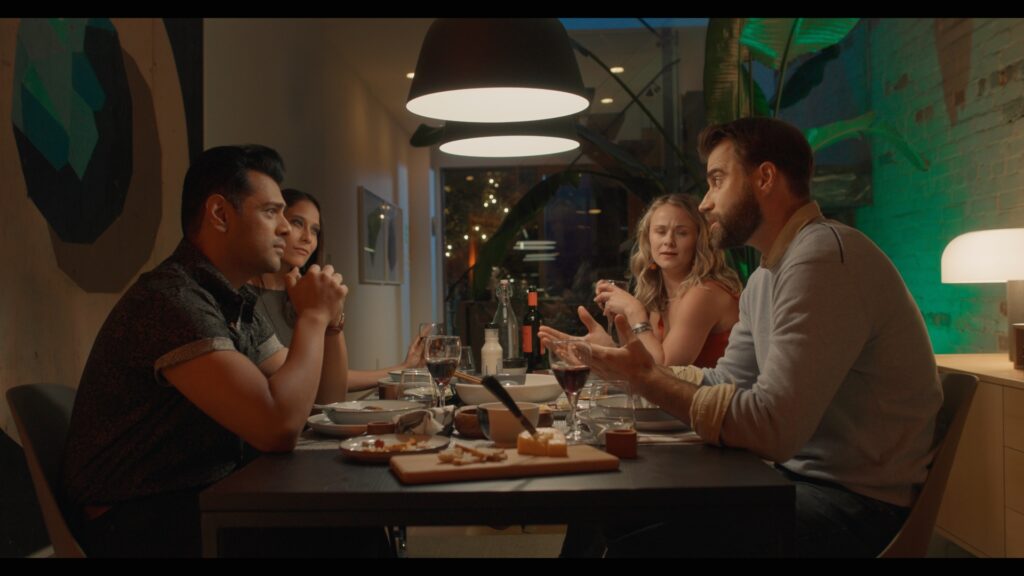Invited to a long overdue rendezvous, charismatic power couple Matt and Sam arrive at the stylishly renovated family home of Peter and Ava for an intimate dinner. The husbands, once fast friends from university, now distanced by opposing lifestyles and careers — Peter a zealous professional political speechwriter, Matt a modestly successful architect — struggle to reanimate shared memories of the past. Ava and Sam — journalist and teacher turned stay-at-home mom to 2-year old Harper respectively — surf on the resulting, somewhat forced surge of unremarkable small talk. Little by little, the mundane tipsy chatter swells out of control, mounting into a brutal torrent of shocking revelation and raging self-defence, ultimately engulfing all in attendance.
Marriages bend and crack. Bitterness and resentment explode into a cacophony of abuse. Any hint of closure, any sketchy pattern of resolution is excruciatingly absent in the ensuing blaze of explosive emotions.
Fool’s Game, an intensely engaging short film from Coffeeshop Creative, currently confined to limited press preview status prior to its launch on the international festival circuit, skirts any number of creative perils, not the least of which is its defiance of traditional cinematic storytelling. Here, a truncated three-act structure in which the fundamental notion of catharsis, in the form of methodically plotted denouement, is wholly displaced by an overarching visual metaphor — a chess match played by a pair of anonymous, disembodied opponents locked in a classic Fool’s Game. Achieved in a series of rapid attacks, checkmate arrives swiftly, black queen takes white king. Visual conceit writ large.
Screenwriter Angela Bell’s crisp, literate chronicle of heedlessness and hurt spares us no relief. All the complexity of marital behaviour, all that is equally active and subversive, is scrutinized with unblinking honesty. The unspoken is given biting voice, dramatic consequences bravely confronted.
Optimism may be in short supply here, even the thinnest air of possibility and hope stripped from Bell’s biting, sharply observed script but so too is the slightest suggestion of a rush to judgement or the least hint of moralizing. Relationships are precious. Humans excel in devaluing them. Jeopardy prevails.
Subtext is everything in Fool’s Game.
A meticulous sense of craftsmanship, a dedicated collective command of purpose underlies virtually every frame of this carefully wrought 15-min. showpiece with consistent finely tuned contributions from cast members and creatives alike, fade up to fade out.
Jordan Duarte as Peter Graham and Fuad Ahmed as Matt Boyer populate the masculine side of the film’s volatile marital diptych. The latter clever and prepossessing, shading to ingratiating. Duarte’s Peter eager to please and open-hearted by way of counterpoint. But it is the wives that most impress. Lora Burke as Ava. Intuitive. Fearful. An unmistakeable note of apprehension manifested in a single fleeting sideways glance. Bell, actor’s cap securely in place, gifts us with a vital, shining Sam, all flashing eyes and quick wits and darting intellect. Director Laurence Roberts teases out an infinity of nuance from the pair, placing them not foreground but middleground in most shots, Burke and Bell essentially anchoring the bulk of the emotionally murderous dinner proceedings.
DOP/editor Stephen Bell brings a mature, understated grace to the production, bathing the Graham dining room monoset in a warm homey glow, lighting rendered instrument of irony, camera a ferociously impartial omnipresence.
Acoustically bookended by composer Ian Cusson’s profoundly affecting original soundtrack, an eternally sad sonata for piano and cello, Fool’s Game deeply engages. Troubles. Surprises. Overturns convention.
There is no centre of absolute good here. Only a lonely abandoned table. And a shattered assortment of survivors.


